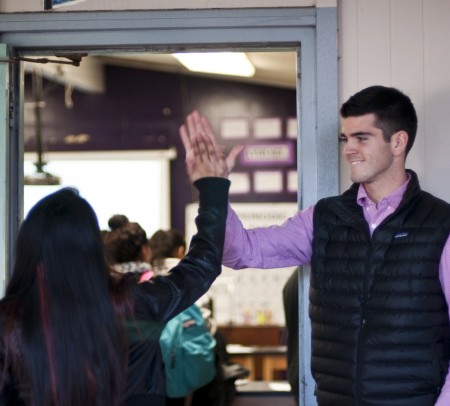Imagine your favorite teacher. Most likely this was someone who challenged the class and made learning fun. We all know well the arguments that teacher preparation organizations are simply not producing enough teachers of this ilk. Through our Learning to Teach Fund, we’re deeply engaged in fostering innovation that will lead to a new norm for teacher preparation, one in which teachers are well prepared for the demands of the classroom from day one.
 To build this market, we need to change the policies that exist today. That’s why we, along with over 90 leaders from across the education field, support the Growing Excellent Achievement Training Academies for Teachers and Principals (GREAT) Act, introduced in the Senate and the House Thursday, May 23rd. Notably, in an era of hyper partisanship, GREAT has bipartisan support.
To build this market, we need to change the policies that exist today. That’s why we, along with over 90 leaders from across the education field, support the Growing Excellent Achievement Training Academies for Teachers and Principals (GREAT) Act, introduced in the Senate and the House Thursday, May 23rd. Notably, in an era of hyper partisanship, GREAT has bipartisan support.
GREAT proposes that states be given latitude to provide dollars to teacher and principal training organizations that exhibit a laser-like focus on those skills, practices, and attitudes that research demonstrates are essential to making teachers and leaders effective from day one, and that are willing to be held accountable for the growth in student learning their graduates produce.
GREAT fosters the type of innovation necessary to produce an entirely new level of results across the field. The timing couldn’t be better – the need and the opportunity stand starkly before us.
Recent research by TNTP, an organization with a track record of identifying keys to improving teacher quality, underscores the need. Leap Year, a study of nearly 1000 first-year teachers shows that teachers who struggle from the start rarely come close to becoming effective, and that mastery of a few critical skills often distinguishes effective from ineffective teachers. Bottom line: good teaching can – and must – be taught.
Organizations are rising to meet this challenge, and GREAT will accelerate the growth of these and other innovative approaches that are emerging across the field. At the MATCH Teacher Residency program in Boston, candidates experience over 80 teaching simulations — with feedback from coaches each time they teach — before they are considered for student teaching. At the Relay Graduate School of Education, students get intensive clinical training, complete with video review of the micro-practices and daily routines that make the difference between great teaching and mediocre teaching. Relay calibrates its trainees’ work against the learning outcomes of students – not just standardized tests, but also the ability of students to make persuasive arguments, decode complex material, and develop creative problem solving capacity. USC’s online Masters program combines state-of-the-art online learning with field-based teaching experiences. Like Relay, USC commits to strong student growth, as determined by a blend of measures, in the classrooms of its graduates. Others, like TNTP and Urban Teacher Center, similarly base their curricula on the knowledge and skills of excellent teachers and prioritize K12 learning outcomes in assessing their students and their programs.
If these approaches to teacher preparation seem logical, you are right. Paradoxically, current law makes it difficult for organizations to adopt practices that are at the core of these models. Instead, institutions are rewarded for meeting input measures: how many books in your library, how many courses do trainees take, and how many of their courses are taught by tenured faculty (ie. researchers with little experience in classrooms).
Through years of convening the teacher prep community and the recent formation of the Learning to Teach Fund, NewSchools has long been committed to improving teacher training and currently supports the MATCH Teacher Residency, Relay GSE, TNTP and Urban Teacher Center through funding and guidance. We are glad to be part of a growing movement finally addressing this too long ignored problem, as Scholastic’s Alexander Russo points out. We are encouraged by the real progress that GREAT represents and we are proud to stand behind it.


